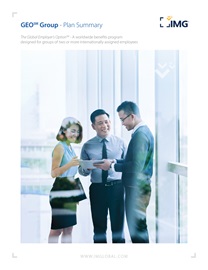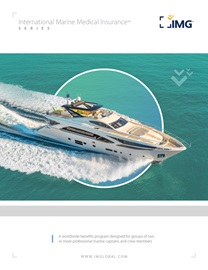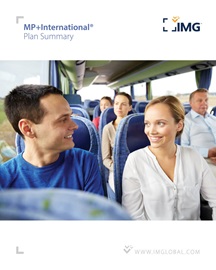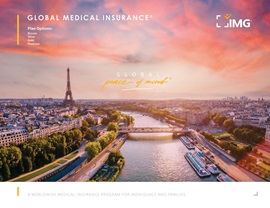Insurance
Choose the plan that meets your needs and spend more time enjoying your international experience not worrying about your insurance coverage.
Find Your PlanWhat type of coverage
do you need?
Travel Medical
Insurance
Temporary coverage for accidents, sicknesses, & emergency evacuations when visiting or traveling outside of your home country.
International Health Insurance
Annually renewable international private medical insurance coverage for expats and global citizens living or working internationally.
Travel
Insurance
Coverage designed to protect you from financial losses should your trip be delayed, interrupted, or cancelled.
Enterprise Services
Meet your duty of care obligations with confidence, knowing your travelers are safe, healthy, and connected wherever they may be in the world.
Show ServicesWhat type of organization do you represent?
Medical & Travel
Assistance
Your travelers can access 24/7 global support should they need medical attention, travel assistance, or medical transport services.
Global Workers' Compensation Case Management
Rest assured knowing you have an experienced team who is committed to reducing your costs, moving your files forward, and serving as an international resource for all your work injury claims.
Security Assistance
Services
Keep your travelers safe, no matter where they are, with real-time alerts and intelligence on safety, health, political, and other global risks.
Insurance Administrative
Services
You’ll have experts to guide you through all things related to your health care plan needs, from enrollment to claim reimbursement.

International Health Insurance
International Health Insurance provides long-term coverage to people living or working outside of their home country, typically for one year or longer. These plans are ideal for expats and their families, individuals with dual residences, multinational employers, and more. Being a global citizen can be an exciting experience, yet one that can pose many potential risks. Your health care abroad should not be one of those concerns. IMG offers revolutionary programs that provide the flexible worldwide coverage you need, backed by the world-class services you expect.
IMG's flagship international medical insurance plan, Global Medical Insurance, allows you to custom build a plan that is specifically tailored to you. The program provides benefits suitable for individuals and families, provides fully portable 24 hour coverage, and gives you the global piece of mind you are seeking. Additionally, the plan was designed to provide long-term, worldwide medical cover that allows you to receive and continue treatment wherever you choose.
Popular Plans
Ideal for Expats & Global Citizens
Group International Health Insurance Programs

The Global Employer's Option - GEO Group
Employer-sponsored group health insurance for internationally assigned employees.

International Marine Medical Insurance
Long-term (1+ year) medical coverage for professional marine crew.

MP+ International
Worldwide employer-sponsored group health insurance for mission groups.
Recent Blog Articles
Cleaning Travel Hacks – Tips to Stay Healthy While Traveling
Gone are the days of only the “germophobes” wiping down their airplane seat before getting settled on their flight. The coronavirus pandemic brought to light the importance of personal sanitization in a way that many have never seen before. Now that people are more aware of the risks they may face in public environments, the want and need to sanitize their surroundings for their own health and safety will be higher than ever. Keeping a clean home and work environment is one thing, but how do you ensure that your next vacation spot will be up to your cleaning standards? Here are some cleaning hacks and tips on how to stay healthy when it’s time for your next trip.
Pack Your Own Disinfecting Supplies
Packing your own disinfecting supplies guarantees that you have access to exactly what you need throughout your trip. In your carry-on, consider packing disinfecting wipes, travel size disinfectant spray, tissues, and hand sanitizer. Typically, airlines restrict the hand sanitizer size to 3.4 ounces. As of May 2020, some are allowing up to 12 ounces. Be sure to check with your airline to confirm the liquid allowances of items that you will use to clean the non-porous areas on your flight. You will also want to use the disinfecting wipes to wipe down hard surfaces in your hotel room. Finally, hand sanitizer is useful for those moments when you don’t have access to soap and water.
If you want to take your cleaning efforts to the next level, you can also include:
- Slippers or flip flops for the room
- Pillowcase
- On-the-go clothing detergent
- Ziploc bags (to avoid touching remote controls or other small items)
- Bag for dirty laundry
- UV light wand
How To Clean an Airplane Seat
Before you even board your flight, hit the bathroom in the terminal. Not only can you avoid having to use the cabin bathroom, but it is also a great opportunity to wash your hands. According to the CDC, hand washing is one of the best ways to prevent getting sick.
Once you’ve boarded, you should wipe down everything by your seat that you may end up touching. Use your disinfecting wipes to wipe down the seat, seat belt buckle, window shade, air vent, arm rests, screen, and most importantly, the tray table. Tray tables are notoriously dirty and prone to germs. Don’t forget to wipe down your cell phone as well.
After you’ve settled in, grab a squirt of that hand sanitizer. For the remaining time of the flight, try not to touch your face, eyes, or mouth.
The most common mistake people make when getting their area prepared is that they turn off their air vent. Many airlines have HEPA (high efficiency particulate air) ventilation systems which capture 99.9% of germ particles. By letting the air circulate, it is cleaning the particles rather than letting germs grow in stagnant air.
Hotel Germ Hot Spots
Hotels and other accommodation areas have their own common areas for germs. Remove your shoes when you first enter the room to avoid bringing the outdoors inside with you. If you packed those slippers or flip flops, now is the time to bring them out. Be sure to place your suitcase on the suitcase holder, or any other surface besides the bed. Again, you don’t want to bring those traveling germs with you into your bed. Inspect the room to see if you come across anything that looks suspicious. Check the sheets, the toilet, and the drawers. If you do come across anything less than excellent, call down to the front desk. They may arrange for you to switch rooms or provide another round of cleaning.
Use your disinfectant wipes and spray to wipe down high traffic areas in the room. The toilet, sink, and countertops are often overlooked. Rinse out the coffee mugs, cup, and coffee maker with hot water. Wipe the headboard, alarm clock, phone, and remote. If you brought a Ziploc bag, place the remote into the bag as an extra precaution. Forgot the bag? No worries – usually hotels seal their disposable coffee cups in plastic bags. You can borrow them from the cups to protect your hands from the remote. The remote tends to be the dirtiest item in the room, so be sure to use some type of sanitation method. If you are allergic to Lysol or disinfectant wipes, consider investing in a UV light.
Hotel room sheets get changed after every guest, but there is not a guarantee that the big plush comforter gets washed as often. Take it off the bed and use just the sheets at night. If you packed an extra pillowcase, you can switch it out as well. Just don’t forget to pack it before you leave!
If you are planning on lounging anywhere other than the bed, you might want to call down to house keeping and request an extra flat sheet or two. You can use these to cover any chairs or sofas in the room.
Regarding clothes, many people have designated clothes that they travel in. Rather than wear your once worn travel clothes home, bring some one-time use detergent and wash your clothes in the bathtub. Packing a separate bag for dirty laundry, such as a mesh laundry bag, is an easy way to keep your dirty clothes away from your clean clothes. This is also a common cruise ship hack for extra space (so you’re not constantly sifting through all of your laundry while on vacation).
Protect Your Health
It’s very important to stay hydrated throughout your adventures. Not only does staying hydrated prevent your nasal passages from drying out while flying, but it can also flush toxins and increase your energy throughout the day.
At the end of the day, no one wants to get sick on vacation. We can take as many precautions as possible to protect our health and sometimes, we still fall ill. Most domestic health insurance plans do not provide adequate coverage while traveling internationally. That’s why it’s important to evaluate which travel medical insurance plan best fits your needs. Traveling with peace of mind, knowing that you have support and coverage if the unexpected happens is well worth the investment. View IMG’s travel medical insurance plans and compare benefits here.
Disclaimer
This is not an offer to enter into an insurance contract. This is only a summary and shall not bind the company or require the company to offer or write any insurance at any particular rate or to any particular group or individual. The information on this page does and will not affect, modify or supersede in any way the policy, certificate of insurance and governing policy documents (together the "Insurance Contract"). The actual rates and benefits are governed by the Insurance Contract and nothing else. Benefits are subject to exclusions and limitations.
